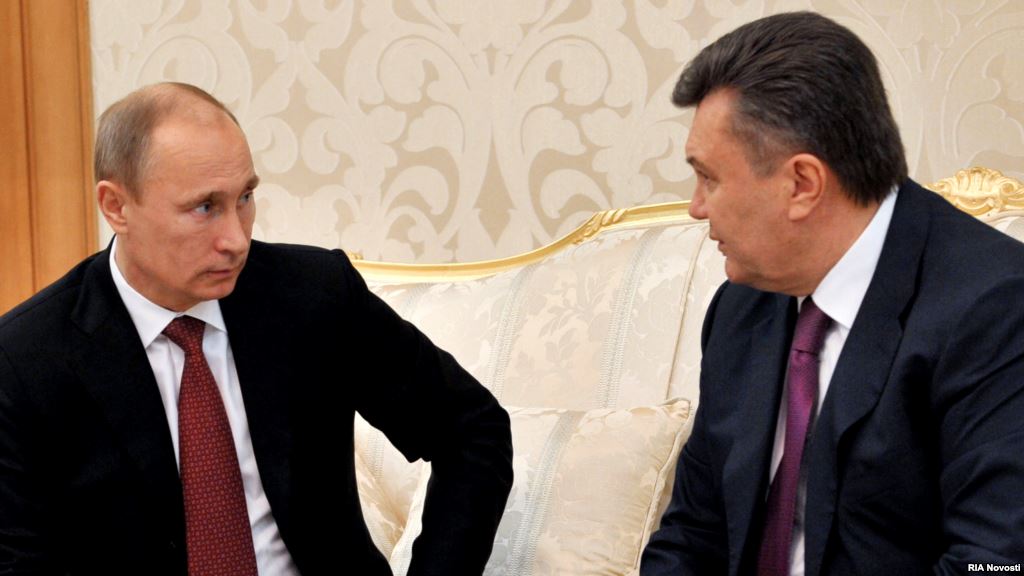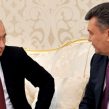
Putin’s Ukrainian Triumph Is a Major Setback for Russia
Publication: Eurasia Daily Monitor Volume: 10 Issue: 212
By:

The Ukrainian government’s shocking decision to put on hold the process of finalizing the Association Agreement with the European Union, announced last Thursday (November 21), a week prior the momentous Eastern Partnership summit in Vilnius, could be interpreted as Russia’s success in sabotaging Kyiv’s “European choice” (see EDM, November 22). President Vladimir Putin expressed his resolute disapproval of the long-prepared EU-Ukraine agreement two months ago at the pompous meeting of the Valdai Club. And he now prepares to savor the triumph of his ill will, while accusing the EU of attempting to “blackmail” Ukraine to cancel the cancellation (https://ria.ru/world/20131122/979024045.html). The absurdity of this accusation is underscored by the fact that he personally orchestrated the most blatant bullying of Ukraine’s leadership and made President Viktor Yanukovych a proverbial offer that could not be refused at the “secret” meeting staged on November 9, at the Novo-Ogarevo presidential residence outside Moscow (https://lenta.ru/articles/2013/11/22/fail/). In reality, however, this forced turn in Ukraine’s maneuvering between the EU and Russia could signify a major setback for Russia’s own needs to re-energize the country’s modernization.
It is the economy that is commonly assumed to be the central subject in tri-lateral controversies, and indeed, Russia’s not-so-gentle squeeze on Ukraine’s exports has seriously aggravated the latter’s economic troubles. Kyiv cannot realistically expect that an agreement with the EU would compensate for the sanctions that Moscow has threatened to apply, but neither can it cope with the demands from the International Monetary Fund to eliminate subsidies and cut the budget deficit (https://polit.ru/article/2013/11/22/al221113/). Yanukovich may, on the other hand, count on tangible economic “gifts” from Russia—first of all a discount on the natural gas price, which determines Ukraine’s trade deficit (Nezavisimaya Gazeta, November 18). Putin, however, is not known for a generous disposition, particularly at the expense of Gazprom, which still has a market capitalization some 60 percent lower than in mid-2008; he is deeply worried about the stagnation of Russia’s economy that pulls the federal budget into the “red zone” (Kommersant, Novye izvestiya, November 21). Consequently, instead of a respite from its downward economic spiral, Ukraine might experience a painful crisis spasm if it links its economy too closely to Russia’s (https://www.forbes.ru/mneniya-column/mir/247736-vo-chto-oboidetsya-ukraine-otkaz-ot-assotsiatsii-s-evrosoyuzom).
For the Ukrainians, it will be clear where to allocate the blame; and Putin, who is seriously unpopular now, is set to become the mastermind of a disaster (https://grani.ru/Politics/World/Europe/Ukraine/m.221433.html). Yanukovych may weather the storm of instant protests, but the deepening domestic discontent, which has already taken the catchy name “Euro-Maidan,” is likely to destroy his plans for re-election in 2015 (Novaya Gazeta, November 22). It is in these political calculations and manipulations that the real reason for Ukraine’s failure to connect with the EU is hidden. Brussels has not promised Kyiv much in short-term economic benefits but, rather, demanded of Ukraine greater transparency in financial flows, harsher measures against corruption, and firmer commitments to democratic reforms. These demands are rather discomforting for Yanukovych and the oligarchic clans that are backing him, but for Putin they constitute a direct security challenge. Therefore, the proposal to hold joint EU-Ukraine-Russia talks for optimizing the partnership is merely a hoax (Kommersant, November 23).
The fact of the matter is that Russia, under Putin’s newest term as president, has resolutely moved from a partnership (awkward as it was) to outright hostility in relations with the EU, driven not so much by economic or gas-political tensions as by conflict between European values and the authoritarian code according to which Russia is ruled. Ukraine is caught in this conflict and, as former prime minister of Ukraine Yulia Timoshenko has warned Yanukovych from her prison cell, breaking the deal with the EU will force the Ukrainian head of state to now follow the Russian “road map” (https://echo.msk.ru/blog/echomsk/1203414-echo/). The Ukrainians know how to rid themselves of such leadership, but a deeper problem is that Russia’s attempt to establish its own “civilizational model” and geopolitical “center of gravity” is effectively self-defeating (https://www.gazeta.ru/comments/column/nikolaev/s62993/5760693.shtml). A Ukraine associated with the EU could have been a useful connection to the troubled but pivotal realm of economic activity and political modernization; a Ukraine associated with the dysfunctional Custom Union becomes a crushing burden for Russia.
Putin probably understands that the Vilnius “victory” over the unfriendly EU reduces Russia’s partnership with Europe to mere co-existence. So he has tried to execute his own eastward “pivot” by travelling to Vietnam and South Korea and by exploiting to the maximum his accidental achievement in securing Syria’s chemical disarmament (https://www.gazeta.ru/comments/column/lukyanov/5762601.shtml). He particularly wanted to elevate relations with Turkish Prime Minister Recep Tayyip Erdogan, but their personal chemistry did not prevent the bitter disagreements over Syria to prevail in the annual meeting of the bilateral Russia-Turkey Cooperation Council (Kommersant, November 23). Putin was also unable to give a meaningful answer to Erdogan’s direct request to join the Shanghai Cooperation Organization, where China has the decisive voice (https://ria.ru/world/20131122/979030661.html). The breakthrough in the long-deadlocked negotiations on the Iranian nuclear program was achieved essentially by the United States’ efforts through back-channels, which not only devalues Putin’s success in letting the Syrian civil war rage without interference but also boosts the prospect that renewed flows of Iranian oil might push down the price on the global market (https://newsru.com/world/24nov2013/agreed.html).
In a peculiar way, every victory that Moscow manages to score on the international arena exposes the underlying weakness of its ambition to be accepted to the ranks of “sovereign” players who allegedly decide the fate of the multi-polar world. Guarding anxiously this all-important “sovereignty,” Russia finds itself in a far-from-splendid isolation as neighbors grow wary of its egocentric behavior; even allied Belarus resorts to blackmail to obtain new gratuities from Russia.
This isolation seriously deforms the growth of Russian civil society. Putin’s security services personnel (siloviki), obsessed with exterminating the alleged security threat posed by foreign-sponsored non-governmental organizations (NGO), try to make an object lesson in deterrence-by-punishment by prosecuting the Greenpeace activists, who dared to protest against Gazprom’s drilling in the Arctic. The outrage in the international eco-milieu is so strong that Russian authorities had to backtrack and release 29 out of the “Arctic 30” on bail, while facing the verdict of the International Tribunal for the Law of the Sea to release the captured Arctic Sunrise Greenpeace vessel (https://lenta.ru/news/2013/11/23/refuse/).
Putin’s iron grip on Yanukovych’s policy choices is certain to mobilize millions of Ukrainians who see no alternative to the European choice, but Russia will discover that its own hard climb to Europe from the quagmire of Putinism has just become yet another degree steeper.




